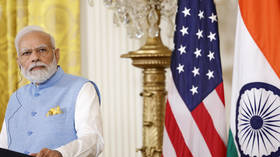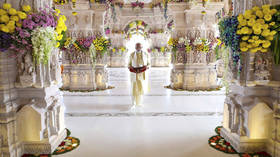Modi lashes out at critics of India

Indian Prime Minister Narendra Modi lashed out at his critics during an interview with Newsweek, suggesting that some people in India and in the West have “lost touch” with the country’s “thought processes, feelings and aspirations.”
In the interview, just days before the country’s parliamentary elections, Modi vehemently defended India’s status as a “democracy,” arguing that this is “not just in the constitution” but in “our genes.”
Modi’s government and the ruling Bharatiya Janata Party (BJP) have repeatedly come under attack, both from the opposition as well as Western officials and media, over alleged attempts to “silence” critics of the administration.
The allegations resurfaced last month, when Germany and the US commented on the arrest of Delhi chief minister and leader of the opposition, Aam Admi Party Arvind Kejriwal, on corruption charges. New Delhi lashed out angrily at both countries, criticizing the interference in its internal matters, and summoning their diplomats.
Modi also emphasized the role that the media plays in the country’s political system, arguing that a “democracy like India is able to move ahead and function only because there is a vibrant feedback mechanism.” More than 150,000 registered media publications and hundreds of news channels operate in the country, the prime minister noted as he responded to his critics’ “dubious claims of diminishing media freedom.”
The Indian government is often criticized for alleged attempts to “silence” the media. The allegations resurfaced last year when police carried out raids on dozens of reporters linked to Newsclick, an online media platform.
Meanwhile, Western outlets such as Bloomberg have suggested that billionaires close to Modi – such as Gautam Adani – are taking over news outlets and “squeezing” press freedom in the South Asian country. Last year, Adani’s conglomerate bought a majority stake in NDTV, a news channel seen as having an anti-Modi slant.
The prime minister also tackled critics who claim that minorities are being discriminated against in the country. Even India’s minorities do not buy that narrative anymore, he said, claiming that they are all thriving under his government’s policies. “Our government has come up with a unique saturation coverage approach when it comes to schemes and initiatives,” he said. “They are not restricted for [being] a group of people belonging to a particular community.”
India has been accused of religious discrimination on many occasions, most recently after the implementation of the Citizenship Amendment Act (CAA), which helps refugees from “persecuted minorities” (such as Hindus, Sikhs, Buddhist and others) from neighboring Muslim-majority countries to get Indian citizenship. Critics of the law have questioned why Muslim refugees were not included.
After Washington waded into the controversy over the new law, with the White House claiming that it was “closely monitoring” how it would be implemented, New Delhi criticized the comments as “misplaced, misinformed, and unwarranted. A spokesman for India’s Foreign Ministry said the CAA was an “internal matter” and was aimed at granting “a safe haven to persecuted minorities.”
Where India Meets Russia – We are now on WhatsApp! Follow and share RT India in English and in Hindi














